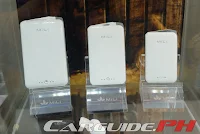 |
| Photos by Ulysses Ang |
A couple of hours earlier, we found ourselves at Shenzhen’s largest electronics market. It’s like Greenhills, but way bigger. Buildings are filled with all sorts of electronic goods; and people half-jokingly say that every electrical component you’re looking for is in here. You see a makeshift desk where workers solder a touchscreen together with one hand while the other is focused on lunch. On the floor, a person squats, packing Hello Kitty power banks from corrugated boxes into flimsy retail packaging while another checks iPhone cases for fitment using a plastic mock-up. Those that don’t make the cut end up in the trash.
This is a microcosm, representative of China’s profiteering ways without a care for quality or innovation. They sell by sheer volume, earning a quick buck by simply copying or imitating products. And Harry wants no part in this.
Starting out as a sub-contractor for mobile phone batteries in 2003 under Hali-Power, the company introduced its own brand, MiLi in 2008. Seeing how Apple is changing the mobile phone landscape with the iPhone—a product that’s both cutting-edge and market savvy, MiLi saw an opportunity to be aligned the same way. Levering their expertise in mobile phone batteries, MiLi developed and marketed power banks as a mobile charging solution for power-hungry Apple i-devices.
Starting this year though, MiLi faces a precipice that’s bound to alter the course of the company. With increased competition in the mobile phone accessories front, they’re shifting their attention to becoming a developer of smart products. Though batteries and storage solutions remain an integral part of their business, Harry believes they’re already reaching their peak. They know they have to push the innovation envelope further. Enter smart technology.
“We are at a historic point in the company’s history,” explains Harry. “We see a new direction for the company because of the prevalence of more and more sensors that make smart technology possible. And by tying this to Apps, users have an experience in technology that makes it relevant for them.”
It’s a phrase mentioned time and again: technology not simply for the sake of technology. For MiLi, this means focusing on products that cater to beauty and wellness not only because they see a sizeable market there, but also because they believe smart products should be proactive rather than reactive.
“When you get treated for sunburn, it’s a reactive procedure due to UV ray exposure,” explains Harry. “Smart technology should negate the use for these occurrences.”
Last year, MiLi introduced their first smart product that integrates both software and hardware: Pure, a skin moisture detector. This year, they’ve followed it up with Skin Mate, a pocket-sized UV detector. These devices have an everyday relevance for users, whether he or she is a techie or not. Furthermore, by combining a software and hardware platform, it eliminates the risk of having counterfeit products.
This forms the foundation of MiLi’s new corporate direction. Harry hopes that one day, consumers will have integrated product solutions where his company’s technology can be found in everyday household items. For instance, the skin moisture detector can be integrated on bottles that tell users how much or little moisturizer to use. As sensor technology becomes much more affordable, this becomes possible. And when asked why the company decided to focus on these products as opposed to wearables, the biggest IT trend at the moment, Harry says that it’s hard to compete in a market with a lot of competitors. Besides, he thinks Apple has it down pat with the iWatch, so why compete when you can compliment.
They also see their future in HomeKit, Apple’s framework for communicating with and controlling accessories such as lights in a user’s home. HomeKit allows users to configure these accessories and create actions to control these devices. They can even group actions together and trigger them using the Siri voice assistant. During our brief tour, Harry showed a potential HomeKit device which they hope will be the first of its kind. We can’t talk any more about it because it’s still pending Apple’s approval, but once it gets certified, it’ll be sold in Apple retail stores around the world.
Shenzhen is one of China’s main IT manufacturing hubs and the huge electronic market is testament to that. However, Harry doesn’t see a future there. Educated in Canada, he believes that in order to survive and flourish in the fast-paced IT world, his company has to shift its focus from manufacturing and instead move towards a design and sales/marketing orientation. Though he wants to foster home-grown talent in Shenzhen, for now, he says fields like marketing are still in its infancy in China. To resolve this, he has hired people from Hong Kong to help his communicate the MiLi brand.
MiLi’s non-traditional approach should serve as a constant reminder to all those doing business. Relying on being a copycat with a cheaper price tag makes one vulnerable. This kneejerk reaction is commonplace here in the Philippines where it’s become more of copy thy neighbor. MiLi shows that a company has to constantly innovate and not simply imitate to stay ahead. Harry and his team are constantly looking towards the long-term prospective, relying more on the strategic rather than a tactical position.



















No comments:
Post a Comment
Feel free to comment or share your views. Comments that are derogatory and/or spam will not be tolerated. We reserve the right to moderate and/or remove comments.